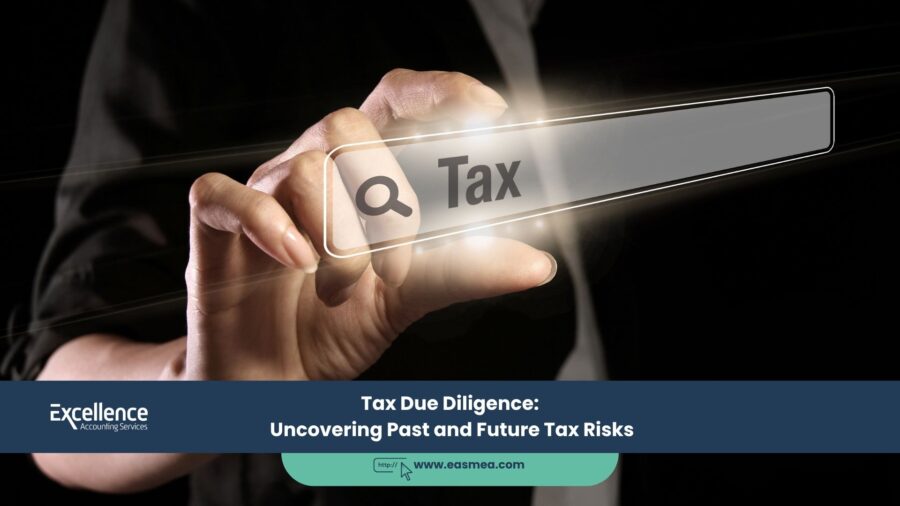Tax Due Diligence: Uncovering Past and Future Tax Risks
When you buy a business in the UAE, you are not just acquiring its assets, customers, and future potential; you are also inheriting its history, including its entire tax history. While financial due diligence focuses on the quality of earnings and legal due diligence examines contracts and corporate structure, a third, equally critical investigation is required: Tax Due Diligence.
Tax due diligence is a specialized and forensic review of a target company’s historical tax compliance to identify, quantify, and mitigate any past, present, or future tax risks. In the context of the UAE’s evolving tax landscape, this process is more critical than ever. An undiscovered error in a past VAT return or a misinterpretation of the new Corporate Tax law by the seller can become a significant financial liability for you, the buyer, the day after the deal closes. It is the ultimate safeguard against inheriting someone else’s tax problems.
This guide will explain the crucial role of tax due diligence in any M&A transaction in the UAE. We will break down the key areas of review for both VAT and Corporate Tax, clarify how it differs from financial due diligence, and demonstrate how its findings are used to protect you in the final purchase agreement.
Key Takeaways
- Tax DD is a Specialized Review: It is distinct from a financial audit and focuses specifically on identifying and quantifying tax compliance risks.
- You Inherit the Tax History: When you buy a company, you typically inherit its past tax liabilities. Tax DD is your primary defense against this.
- Covers All Taxes: A thorough review must cover both historical VAT compliance and the company’s position and readiness for UAE Corporate Tax.
- Quantifies the Risk: The goal is not just to find issues, but to put a number on them. An estimated liability of AED 500,000 is a powerful negotiation tool.
- Findings Impact the SPA: The results are used to negotiate the purchase price and, crucially, to draft specific tax warranties and indemnities in the Sale and Purchase Agreement (SPA).
- Must Be Done by Experts: Tax due diligence requires deep, specialized knowledge of UAE tax law and should only be performed by qualified tax advisors.
The Core Components of a Tax Due Diligence Investigation
A tax due diligence team will systematically review every aspect of the target’s tax profile. The investigation is built around two main pillars in the UAE context.
Pillar 1: VAT Compliance Review (The Look-Back)
Since VAT was introduced in 2018, this historical review is crucial to uncover any past sins that could lead to future penalties.
- Review of Past VAT Returns: A detailed reconciliation of all VAT returns filed against the company’s audited financial statements.
- Output Tax Verification: Sample testing of sales invoices to ensure VAT was charged correctly on all taxable supplies and that revenue was not understated.
- Input Tax Recovery Scrutiny: This is a major focus area. The team will:
- Test a sample of purchase invoices to ensure they are compliant tax invoices.
- Verify that no input tax was reclaimed on blocked expenses like client entertainment.
- Review the logic and calculation of any input tax apportionment for mixed-use supplies.
- Reverse Charge Mechanism (RCM) Check: Verify that RCM was correctly applied to all imported goods and services.
- Review of FTA Communications: Examine any correspondence with the FTA, including past audits, clarifications, or penalty notices.
Pillar 2: Corporate Tax Risk Assessment (The Look-Forward)
With Corporate Tax being new, this part of the review assesses the company’s current compliance and future risk profile.
- Taxable Income Calculation Review: Analyze the company’s calculation of taxable income, paying close attention to the deductibility of expenses.
- Transfer Pricing Analysis: For businesses with related party transactions, this is a critical area. The team will assess if the company has a compliant transfer pricing policy and the documentation to support it.
- Free Zone Status Verification: For a Free Zone entity, the team will conduct a rigorous assessment to determine if it truly meets all the conditions to be a Qualifying Free Zone Person (QFZP). A failure here could mean a 9% tax liability instead of 0%.
- Small Business Relief Eligibility: Verify the company’s eligibility if it has claimed or intends to claim Small Business Relief.
Tax Due Diligence vs. Financial Due Diligence
While often performed together, these are two distinct disciplines with different goals.
| Attribute | Financial Due Diligence (FDD) | Tax Due Diligence (TDD) |
|---|---|---|
| Primary Goal | To determine the target’s sustainable, recurring profit (Quality of Earnings). | To identify and quantify historical and potential tax liabilities. |
| Focus | Profitability, working capital, net debt. | Compliance with tax laws, tax exposures, tax attributes (e.g., losses). |
| Key Output | Adjusted EBITDA, a key input for valuation. | A list of quantified tax risks and recommendations for the SPA. |
| Performed By | Transaction advisory accountants. | Specialized tax advisors and professionals. |
Protect Your Investment with EAS Tax Due Diligence
Don’t let hidden tax liabilities derail your acquisition. The expert tax team at Excellence Accounting Services (EAS) provides comprehensive tax due diligence services designed to give you a clear and complete picture of your target’s tax health.
Our Tax Due Diligence Services:
- Comprehensive Tax Review: We conduct a deep dive into the target’s VAT and Corporate Tax history and current position to identify all potential exposures.
- Risk Quantification: We don’t just find problems; we put a number on them, providing you with a clear estimate of potential liabilities to use in your negotiations.
- SPA Advisory: We work directly with your legal counsel to translate our findings into robust tax warranties and indemnities in the Sale and Purchase Agreement.
- Integrated Approach: Our tax team works hand-in-hand with our financial due diligence and business valuation teams to provide a seamless, holistic view of the transaction.
Frequently Asked Questions (FAQs)
A tax indemnity is a specific clause in the SPA where the seller agrees to reimburse the buyer for any pre-closing tax liabilities that may arise after the deal is completed. It’s a contractual promise that acts as an insurance policy for the buyer against any tax problems from the seller’s period of ownership.
Yes. An FTA audit may have only covered a specific period or a specific issue. It is not a comprehensive clearance of all potential tax risks. Furthermore, the company’s interpretation of a new law (like Corporate Tax) may not have been tested yet. A clean FTA audit history is a good sign, but it is not a substitute for your own due diligence.
If a specific, quantifiable historical tax liability is identified (e.g., AED 200,000 in incorrectly reclaimed VAT), the buyer will typically demand a dirham-for-dirham reduction in the purchase price. For more uncertain future risks, the buyer will seek protection through indemnities in the SPA.
For a Free Zone company, a major red flag is any ambiguity around its status as a Qualifying Free Zone Person (QFZP). If there’s a risk it doesn’t meet the substance or qualifying income tests, its expected 0% tax rate could become 9%, which would fundamentally destroy the company’s valuation.
No. The seller’s advisor has a duty to their client, the seller. You must engage your own independent tax advisors to conduct due diligence on your behalf and to represent your interests.
The standard statute of limitations for the FTA to review records is five years. Therefore, the due diligence should cover at least the last five years of the company’s operations for VAT. For Corporate Tax, it will cover all periods since the law became applicable to the business.
This gives you leverage. You can use the finding to negotiate a lower price, demand a specific indemnity from the seller, or, if the risk is too large and unquantifiable (e.g., potential tax evasion), you have the option to walk away from the deal entirely, protected by your due diligence findings.
It is an investment in risk mitigation. The cost of a thorough tax due diligence review is almost always a small fraction of the potential historical tax liabilities and penalties it can uncover. It is a necessary cost of a safe acquisition.
A tax warranty is a series of statements in the SPA where the seller confirms that certain tax-related facts are true (e.g., “all tax returns have been filed on time,” “there are no ongoing disputes with the FTA”). If a warranty proves to be untrue, the buyer can claim damages from the seller.
Yes, for a business involved in importing and exporting, a comprehensive tax due diligence review should also cover its compliance with customs regulations and verify that the correct duties have been paid on all imported goods.
Conclusion: The Ultimate Financial X-Ray
If financial due diligence is a health check-up, tax due diligence is the detailed X-ray and MRI scan. It looks beneath the surface to find the hidden fractures and potential problems that could compromise the long-term health of your investment. In the increasingly regulated tax environment of the UAE, it is an absolutely essential step in any acquisition. By investing in a thorough tax due diligence process, you are not just buying a business; you are buying peace of mind.
Don't Inherit Tax Problems. Identify Them.
Our expert tax due diligence team uncovers the risks before they become your liabilities.




